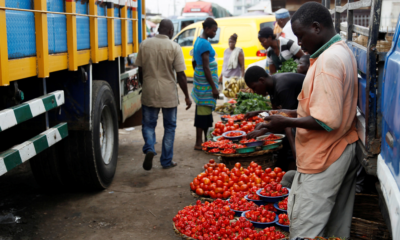NEWS
How To Start Fish Farming In Nigeria

Fish farming in Nigeria is important as fish play an integral role in the eclectic range of ingredients that are essential for traditional Nigerian cuisine. This has contributed to the high consumption and demand for fish in Nigeria.
 Aquaculture is one of the most prominent aspects of the Nigerian Agricultural Industry, with over 60% of the population earning a living through the practice. During 1950s, the fish catch activities reached its peak and increased ten times, but then came a time when fish farming languished and was subjected to dramatic deterioration due to poor environmental conditions, outdated fish farming techniques and the rise of the petroleum industry.
Aquaculture is one of the most prominent aspects of the Nigerian Agricultural Industry, with over 60% of the population earning a living through the practice. During 1950s, the fish catch activities reached its peak and increased ten times, but then came a time when fish farming languished and was subjected to dramatic deterioration due to poor environmental conditions, outdated fish farming techniques and the rise of the petroleum industry.
However, over the last few years, Nigerian citizens have stepped in and made determined attempts to revitalize the fish farming industry in Nigeria.
Today, There are not many otherbusinesses that are as lucrative as fish farming in Nigeria, and also have a major contribution in the country’s gross income.
The Fish Farming industry in Nigeria has substantially developed in recent years. Renewed interest and investment in the industry has meant that there has been a fresh flock of farmers that have joined the industry, and with them they have brought new ideas and ways of working.
This has contributed to a change of methods in raising the livestock from ponds and canals to modern and high-end fisheries.
Fishes are in High Demand in Nigeria
You might decide to start with a small scale fish farm, or jump straight in to the deep end with a large scale fish farm. The choice is yours.
If executed correctly you are on your way to financial security, but don’t believe people who tell you that fish farming is easy. Trust me, it isn’t.
As an aspiring farmer, you must be specific about the type of fish you want to farm.
It’s pretty straightforward so don’t hesitate. Carry out a feasibility study to support your market research and understand what species of fish are in high demand in your local area and extended network. Rule number 1 – Don’t farm what you can’t sell!
For reference, catfish is the most traded fish in Nigeria, seconded by Tilapia, Titus and Prawns. Considering the scope of profit, many farmers have plunged into the fray of aquaculture, but are still skeptical about where to start.
To enable you to immediately take action, I have detailed some vital pieces of insight that will equip you with the necessary knowledge. In the next few minutes, you will learn the benefits of fish farming, types of fishes in demand, costs and the essential equipment required to succeed in finish farming.
Read on to start your journey and to learn all about fish farming in Nigeria.
How to Start Fish Farming in Nigeria
Benefits Of Fish Farming
- Fish products are by far the most popular sources of protein in the Nigerian market, representing more than 60% of meat products in the Nigerian market alone.
Fish is cheaper than meat so is more affordable, which increases its demand due to its affordability.
- Most fish are healthy to eat and are an excellent source of low-fat protein. Eating fish can also reduce the risk of heart disease, diabetes and other chronic illnesses.
Fish are one the biggest sources of Omega-3 fatty acids which help to keep our heart and brain healthy. Our bodies do not naturally produce Omega-3 fatty acids, so it must be obtained through our diet.
- Fish grow at an extremely quick rate from the early stages of being fry to growing to fingerlings, and from fingerlings to marketable size.
This fast growth rate is influenced by food availability, feed quality and stocking density. You must maximize these areas to ensure that you harvest and sell within the shortest time period.
- With proper planning and good management fish farming can be extremely profitable.
-
Fish farming does have environmental impact, but this can be minimised if you implement the correct processes. A direct comparison of the environmental efficiency of food production from the terrestrial versus aquatic environment demonstrates that fish farming creates far less of an environmental impact.
Risks and Problems of Fish Farming in Nigeria
Farming Without Identifying a Market:You must identify your market and secure your customers before you start fish farming. Don’t fall in to the trap of looking for customers when the fish are market size and ready for sale.
If you do, your pond will reach its maximum loading capacity – your fish will stop growing, space will become congested and create unhealthy breeding conditions resulting in high mortality and unhealthy fish, which will have a devastating impact to your profit margin.

Limited Market Opportunities: African fish farmers tend to produce for the local market. In fact there are limited opportunities to export fishes produced in one country to another. The reason for this is the cost of production, cost of cold storage and poor logistical networks, and government international trade policies that do not benefit traders
Limited access to Loans or Capital: Setting up a fish farm is not cheap; it can be extremely capital intensive, much more than other types of farming. Setting up fish farm requires careful planning, knowledge and readily available capital input.
In spite of various government interventions to develop the Agricultural sector of the economy, access to Agric loan is still very limited unless you have a detailed credit history or valuable assets that can be converted to cash, if necessary, to keep up with your payments.
Limited Selection of Fish Species Available for Culturing: The huge amount of available water resources in Africa has the capacity to breed a dynamic range of fish species. Unfortunately, Africans have not taken advantage of these resources. Nigeria is a major culprit and has been guilty of producing limited species of fish – mainly focusing on catfish and tilapia along its fresh waters ways. Other species of freshwater fishes are neglected. As a matter of fact, culturing of saltwater fish is almost none existent in spite of the abundance of saltwater resources available.
Volatile Price of Input and Output: Prices of catfish feeds and feed ingredients are known to be unstable, more so with the recent recession in Nigeria and lack of foreign exchange available.
The volatile economic environment has a direct impact on the price of fish production, which must be passed on to the customer in order to make a profit and stay in business.
Annual Floods and Natural Disasters: Droughts and floods severely impact food and water security in Africa. This can create huge impact which will result in human suffering, deaths, as well as extensive damage to infrastructure, crops and waterways. Damage to infrastructure, crops and waterways are huge contributors to chemicals and other hazardous substances filtering into and contaminating water.
Factors To Consider
Soil and Infrastructure: To successfully enter and operate in the fish trading market, you have to own or have access to good land, have complete accessibility to market and labor. It is imperative that you analyse other conditions such as water sources in the area, the temperature, location and road connectivity.
Registration: Conforming to the rules of the land it is important before initiating serious business that you complete all the required registration and licensing procedure. This will confirm your legitimacy for future business. Register yourself with Corporate Affairs Commission and get a clearance certification.
Source of Water: Before deciding on the water source, decide on the type of pond you wish to set-up. Once the decision is made, contemplate on choosing an incessant water supply and ensure a backup.
Dig a Borehole – Adequate water supply is the lifeblood of a fish farm and lack of it may be catastrophic because water need to be changed at regular intervals.
Naturally available sources of water such as borehole and river water is the most suitable. Rainwater and tap water from chemically treated sources is not recommended for fish cultivation.
Overhead Tank – This is the water reservoir from which water can be supplied to your ponds. The tank must be connected to your ponds through plumbing system so that water can be easily pumped into your ponds when needed.
Fish Food: It is imperative that your fish are healthy. No matter what business you specialise in you should focus on the quality of product. Healthy fish need healthy and nutricious food.
A customer will not handover their hard earned cash for a frail and weak looking fish. If your pool expanse is wide, you need to install an automatic food maker. However, if you have a average sized pool, feed the fishes by hand. Do whatever is within your budget and capability.
Study the Markets: A business needs a strategic and subtle approach. Shed off your lackluster attitude and study your prospective markets to sell your fish. Better yet, look for the markets where the demand for fish never slumps and remains active throughout the year, especially for the fish species you have cultivated.
Secure Site: Most locations are suitable for fish farming if they are in line with suitable ecological factors. Ecological factors to consider are water supply, water quality, climate, hydrological characteristics, soil characteristics and suitable land.

Pond Construction: I’d advise that you engage the service of an expert pond construction engineer, or spend time visiting other fish farms to get an in depth understand of the specification and construction requirements of their fish farm.
You must avoid issues such as pond dikes not being compacted properly or uneven, pond leaks, shallow depth, which will consequently lead to additional construction and maintenance costs while optimum yields are not being achieved.
Fish farming is a businesses that you cannot cut corners. The work must be properly completed to ensure proper drainage.
Where to Source Juvenile Fish: Get your juvenile from another farm or person that specialises in supplying high quality juvenile. You need to go for the high yield species of catfish or tilapia and make sure you are getting it from a healthy farm.
Get Training and Build Your Knowledge: One day training or seminars are not sufficient. I’d strongly advise that you look for groups, forums or successful fish farms so that you can gain proper knowledge and experience. To have a suitable understanding of this trade, you need at least two months training/experience.
Remember, your money is at stake, so the aim is to minimise potential risk and failure.
Investment Plan: Some farmers assume that quantity will ultimately lead to success, so they construct many ponds at once, which ties up all their cash and leaves no available cash for errors or potential unplanned activities. Because of such poorly devised strategies, some farmers may only be able to afford to start production in one pond although they have invested and built multiple ponds.
This is just one of many examples that highlight the importance of a clear investment and business plan.
How Much Does it Cost to Start a Fish Farm in Nigeria?
Congratulations for reading on this far. You must be serious about fish farming, and now for the N10,000,000 question.
So how much does it cost to start a fish farm in Nigeria?
I’m not going to lie, although fish farming can be profitable, it can require a lot of capital upfront, and requires serious planning.
Before jumping in feet first there are certain costs you must calculate such as – the cost of the pond, area and the land quality, sacks of cement, blocks, gravel, bore hole, sand, plumbing, feed and the labor.
Your most important purchase will be the actual fish. You can buy juveniles for N25 to N35 depending on your location, time of year, quantity and quality purchased. Generally, most farmers start the farming process with 1000 fingerlings or juveniles in a pond. Juveniles usually reach market size at 4 to 6 months. The average weight of the fish at this stage should be 1.2kg to 1.7kg. Minimum weight is 800g and maximum 3kg, and you can expect to sell them at N400 to N600 per kg.
To further understand costs lets start with 1000 juveniles as previously discussed, and the intention is to grow them to market size, which is around 1.2kg to 1.7kg

Let’s get the ball rolling by listing the typical expenses that will be incurred whilst preparing, during and after production process. These expenses are:
Building or Renting a Pond: Depending on the design of the pond, and whether you decide to own it outright or lease it. There is a cost attached to both methods. You must prepare your cost analysis with a realistic value.
Pond Preparation: This requires a lot of manual labor, so you may need to hire some extra people to assist you with this process.
The tasks involved include clearing of bushes and shrubs, de-mudding, liming. You should consult an experienced person to advise on the layout and materials used for the pipes, to ensure adequate inflow and outflow of water from your pond. Also at this stage consideration must be given to stability, strength, and thickness of the dike. Failure to correctly implement this may lead to run off water entering into the pond.
Netting: Netting is highly advisable. Setting up nets to prevent predators attacking your stock is an expense that should be included in your startup cost analysis. Don’t wait for predation and pilferage to occur before you decide to set netting.
Buy ing Juveniles: Once your fish farming is set up you can decide to bread your own juveniles and drastically reduce overall costs. But when starting up your juveniles must be sourced from trusted and reliable breeders. The average cost of a juvenile is N30.
ing Juveniles: Once your fish farming is set up you can decide to bread your own juveniles and drastically reduce overall costs. But when starting up your juveniles must be sourced from trusted and reliable breeders. The average cost of a juvenile is N30.
Feeds: This includes cost of various sizes of conventional feed and non-conventional feeds such as poultry waste, earthworms and hatchery waste.
Cost of Feeding: Fish require a regular feeding routine, so if you’re not always available it is advisable that you pay someone knowledgeable and reliable to stick to that routine.
Type and method of payment is at your discretion and preference, but ensure that you include this cost in your overall budget.
Logistics Cost: This includes the expense of transporting your feed, labor to the farm and fish to market or customers.
I’d advise that you closely analyse these activities so that you do not over transport and create waste. The fewer unnecessary activities that you carry out the lower your logistics costs will be.
Security: Cost of securing your pond cannot be ignored especially if your pond is not in a secure location and not constantly under your watch.
Routine Medication: Routine medication is not mandatory but it should be budgeted for. Like any type of business planning you should prepare for the unexpected because there is a possibility that you could experience high mortality (above 30%).
Budget for the cost of laboratory tests, medication and any physical activity that might be needed to reduce mortality and remedy the situation.
Cost of Cropping: Cropping is the removal of fish. Whether you do it yourself or hire an expert. This is a cost that should be included in your cost analysis
Now you’re equipped with all the knowledge required to start fish farming in Nigeria.















